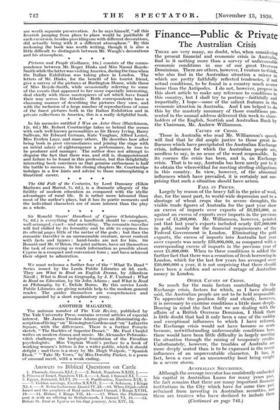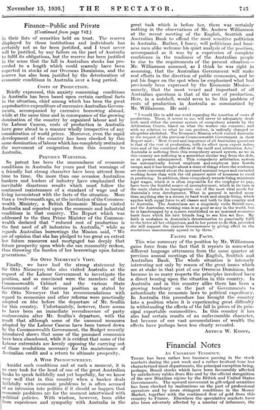Finance—Public & Private
The Australian Crisis
THERE are very many, no doubt, who, when considering the present financial and economic crisis in Australia, i find in it nothing more than a survey of unfavourable economic conditions in one of our great Overseas Dominions. There are others, however, I venture to think, who also find in the Australian situation a mirror in which are pretty faithfully reflected tendencies, if not actual conditions, to be found in a country much nearer home than the Antipodes. I do not, however, propose in this short article to make any reference to conditions in this country, but I shall try to portray—faithfully and impartially, I hope—some of the salient features in the economic situation in Australia. And'I am helped to do this by the masterly summary of those conditions pre- sented in the annual address delivered this week to share- holders of the English, Scottish and Australian Bank by the Chairman, Mr. Andrew Williamson.
CAUSES OF CRISIS.
Those in Australia who read Mr. Williamson's speech will find that he did ample justice to those great in- fluences which have precipitated the Australian Exchange crisis, influences for which the Australian people are, needless to say, in no sense of the word responsible. In its essence the crisis has been, and is, an Exchange crisis. That is to say, Australia has been sorely put to it to obtain the wherewithal for meeting sterling obligations in this country. In view, however, of the abnormal influences which have prevailed, it is certainly not sur- prising that such a situation should have arisen.
FALL IN PRICES.
Largely by reason of the heavy fall in the price of wool, due, for the most part, to world-wide depression and to a shortage of wheat crops due to severe droughts, the visible trade figures of Australia for the past year show an excess of imports over exports of £6,285,000, as against an excess of exports over imports in the previous year of £1,208,000. Mr. Williamson, however, pointed out that last year's exports included nearly £27,000,000 in gold, mainly for the financial requirements of the Federal Government in London. Eliminating the gold exports, the excess of imports into Australia last year over exports was nearly £83,000,000, as compared with a corresponding excess of imports in the previous year of over £1,000,000. When to these conditions is added the further fact that there was a cessation of fresh borrowing in London, which for the last few years has averaged over £20,000,000 a year, it is not surprising that there should have been a sudden and severe shortage of Australian money in London.
OTHER CAUSES OF CRISIS.
So much for the main factors contributing to the Exchange crisis, factors for which, as I have already
said, the Australian people are not to be held responsible. To appreciate the position fully and clearly, however, it is necessary to examine conditions a little more deeply. Bearing in mind the fact that we are dealing with the affairs of a British Overseas Dominion, I think there is little doubt that had it only been a case of the sudden and exceptional influences to which I have referred, the Exchange crisis would not have become so acute because, notwithstanding unfavourable conditions here, there would have been little difficulty in largely meeting the situation through the raising of temporary credits. Unfortunately, however, the troubles of Australia are more deeply seated than is to be expressed in the recent influences of an unpreventable character. It has, in fact, been a case of an unseaworthy boat being caught in a severe storm.
AUSTRALIAN SECURITIES. Although the average investor has confidently embarked his capital in Australian Loans for many years past: the fact remains that there are many important financial institutions in the City which have for some time past refrained from investing in Australian securities, no there arc trustees who have declined to include then'
(Continued on page 745.)
Finance—Public and Private
(Continued from page 742.) in their lists of securities held on trust. The reserve displayed by those institutions and individuals has certainly not so far been justified, and I trust never will be justified, by any failure on the part of Australia to fulfil its obligations, but the reserve has been justified in the sense that the fall in Australian stocks has pro- ceeded to a length which could scarcely have been expected in stocks of our Overseas Dominions, and the reserve has also been justified by the deterioration of economic conditions in Australia over a long period.
COSTS OF PRODUCTION.
Briefly expressed, this anxiety concerning conditions in Australia has been based upon certain cardinal facts in the situation, chief among which has been the great unproductive expenditure of successive Australian Govern- ments, accompanied by excessive borrowing abroad, while at the same time and in consequence of the growing domination of the country by organized labour and by the Labour Caucus, costs of production in Australia have gone ahead in a manner wholly irrespective of any consideration of world prices. Moreover, even the rapid development of the country has been checked by this same domination of labour which has completely restrained the movement of emigration from this country to Australia.
PREVIOUS WARNINGS.
So patent has been the unsoundness of economic conditions in Australia for years past that warnings of a friendly but strong character have been uttered from time to time. On more than one occasion Australian bankers and leaders of industry have emphasized the inevitable disastrous results which must follow the continued maintenance of a standard of wage and of living inconsistent with the facts of the situation. More than a twelvemonth ago, at the invitation of the Common- wealth Ministry, a British Economic Mission visited Australia and reported upon the economic and industrial conditions in that country. The Report which was addressed to the then Prime Minister of the Common- wealth declared that " reduced cost of production is the first need of all industries in Australia," while as regards Australian borrowings the Mission said, " We are of opinion that she has pledged to too great an extent her future resources and mortgaged too deeply that future prosperity upon which she can reasonably reckon, thus throwing the burden of her borrowings upon future generations."
SIR OTTO NIEMEYER'S VISIT.
Finally, we have had the strong statement by Sir Otto Niemeyer, who also visited Australia at the request of the Labour Government to investigate the position, and so convinced were the members of the Commonwealth Cabinet and the various State Governments of the serious position as stated by Sir Otto Niemeyer that his recommendations with regard to economies and other reforms were practically adopted en bloc before the departure of Mr. Scullin for this country. Unfortunately, however, there seems to have been an immediate recrudescence of party controversies after Mr. Scullin's departure, with the result that although some of the unsound measures adopted by the Labour Caucus have been turned down by the Commonwealth Government, the Budget recently introduced shows that some of the promised economies have been abandoned, while it is evident that some of the Labour extremists are keenly opposing the carrying out of those resolutions necessary for the maintenance of Australian credit and a return to ultimate prosperity.
A WISE PRONOUNCEMENT.
Amidst such conditions and at such a moment, it is no easy task for the head of one of the great Australian banks to speak faithfully and yet hopefully, for we know very well that in this country when a banker deals faithfully with economic problems he is often accused Of an intrusion into politics if it should so happen that economic problems are for the moment intertwined with political policies. With wisdom, however, born alike from experience and sympathy, with. Australia in the great task which is before her, there was certainly nothing in the observations of Mr. Andrew Williamson at the recent meeting of the English, Scottish and Australian Bank to offend the most sensitive politician in Australia. Rather, I fancy, will politicians and busi- ness men alike welcome his quiet analysis of the position, accompanied as it was by a expression of complete confidence in the readiness of the Australian people to rise to the requirements of the present situation— Mr. Williamson assumed, as I think he was right in assuming, that the Australian Government will make real efforts in the direction of public economies, and he put his finger on the spot when he emphasized what had previously been expressed by the Economic Mission— namely, that the most- vexed and important of all Australian questions is that of the cost of production. Here, in a nutshell, would seem to be this problem of costs of production in Australia as summarized by Mr. Williamson. He said : " I would like to add one word regarding the question of costs of production. These, it seems to me, will never be adequately dealt with until either the present system of compulsory awards by the Arbitration Courts, based on what the worker can consume, and with no relation to what he can produce, is radically changed or altogether abolished. The Economic Mission which visited Australia at the request of the previous Commonwealth Government in their Report said : Most vexed and important of all Australian questions is that of the cost of production, with its effect upon export indus- tries and of the combined effects of the tariff and arbitration Acts: Australia is suffering from this compulsory award system, as we in this country are suffering in a somewhat similar way from the dole, as at present administered. This compulsory arbitration system has automatically forced employer and employee into hostile camps, and it has brought about a state of things where the workmen are more concerned about the increased nominal wages and curtailed working hours than with the old pioneer spirit of keenness to excel in producing. In addition, these compulsory awards fixing minimum legal wages, which it is often impossible for the employer to pay, have been the fruitful source of unemployment, which in its turn is the main obstacle to immigration one of the most vital needs for Australia's true development. What in general is needed more than anything else is a return to hard work and simple living, which applies with equal force to all classes and both to this country and to Australia. The Australians are a singularly virile British race, and the Australian working man is as good as any in the world, but he is handicapped by a system established on an unsound economic basis from which his best friends long to see him set free. My faith is unshaken in Australia's determination to punctually fulfil to the letter all her obligations, and in her power to do this, provided she will support the various Governments in giving effect to the resolutions unanimously agreed to by them."
FACING THE FACTS.
This wise summary of the position by Mr. Williamson gains force from the fact that it repeats in somewhat different language utterances from the same quarter at previous annual meetings of the English, Scottish and Australian Bank. The whole situation is intensely interesting not only by reason of the great issues which are at stake in that part of our Overseas Dominion, but because in so many respects the principles involved have a direct bearing upon the situation in this country. In Australia and in this country alike there has been a growing tendency on the part of Governments to subordinate the economic laws to political expediency. In Australia this procedure has brought the country into a position where it is experiencing great difficulty in withstanding the effects of the fall in prices of its prin- cipal exportable commodities. In this country it has also had certain results of an unfavourable character, but because of our vast accumulations of wealth the effects have perhaps been less clearly revealed.
ARTHUR W. KIDDY;









































 Previous page
Previous page